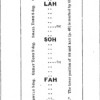
Anna Maria Jones, “On the Publication of Dark Blue, 1871-73″
Dark Blue (1871–73) was a monthly magazine, edited by Oxford undergraduate John Christian Freund, which folded two years after a brilliant debut. During its brief run, it brought together a stunning list of literary and artistic contributors, including Dante Gabriel Rossetti, A. C. Swinburne, William Morris, Andrew Lang, Mathilde Blind, Sheridan Le Fanu, Simeon Solomon, and Ford Madox Brown, who produced aesthetically and sexually daring poetry, art, and criticism. However, it also strove to “appeal to the whole English-speaking public,” as Freund put it, and, thus, included much that might be described as middlebrow, even conservative. Whereas individual texts from Dark Blue, such as Le Fanu’s Carmilla, have received considerable attention, scholars have devoted very little sustained attention to the journal beyond noting its importance as an “artifact” in the history of the Pre-Raphaelite Movement and British aestheticism, and registering puzzlement at the journal’s eclecticism. This essay returns to Dark Blue to uncover common threads among dissimilar writers and artists. With particular attention to the journal’s commitments to transnationalism, I trace three intertwined threads—synesthesia, translation, and sexual dissidence—as they manifest in key texts by Swinburne, Solomon, Le Fanu, and others. Reading these texts in their original context not only demonstrates Dark Blue’s importance to early formations of aestheticism but also helps us to see how aestheticism connects with, rather than stands in opposition to, mid-Victorian culture.

Phyllis Weliver, “On Tonic Sol-fa, January 1842”
In January 1842, John Curwen launched Tonic Sol-fa – a system for teaching people to sing, which he believed would improve individual and national morality. By the third quarter of the century, Tonic Sol-fa numbered hundreds of thousands of practitioners at home and in the colonies, and had outstripped competing sight-singing methods. This essay argues that Tonic Sol-fa promoted a way of managing behavior that worked alongside rational recreation and newly introduced institutional surveillance strategies.
